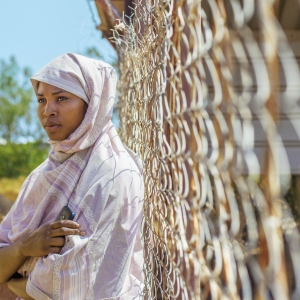Since April 15, 2023, fighting between two military groups in Sudan has disrupted life across the country. Over 160,000 people have already left Sudan, with an estimated 700,000 more displaced internally. For many of the country’s 45 million residents – particularly those who remain in cities like Khartoum, Omdurman, and Bahri – the simplest daily tasks have become elaborate challenges. Disrupted electricity, limited supplies of food and water, and violence in the streets mean balancing personal safety with meeting basic survival needs.
At the same time, communities are pulling together. Extended families and friends are sharing safe spaces, those with cars are making risky journeys to help collect water from the Nile, still others are sharing limited food or sending money to help friends purchase essentials.
It can be easy to forget just how critical basic financial services are until they’re not available. Today in Sudan, the economy for the simplest goods has turned upside down. Many are draining personal savings for a place on a bus out of the country. Yet access to financial accounts is precarious at best. Cash is in limited supply, and pervasive insecurity means the risk of carrying cash has never been higher.
So, it’s imperative to ask – what roles are financial services playing in the unfolding crisis? And why? What must happen next for inclusive finance in Sudan?
The role of financial services in the crisis
For Manal Yassin, CGAP’s consultant in Khartoum, financial services in crisis means something intensely personal. In the early days of the conflict, unable to easily access funds held with a bank, she relied on a friendly nearby grocery store to credit her short-term cash to quickly (and carefully) collect water and food supplies from whatever shops she could find open.
Even in areas of the country without active fighting, formal financial services are largely unavailable – a result of data centers and operations being centralized in Khartoum, the epicenter of the fighting.
Domestic money transfer remains a challenge. To the extent services are operational, transfers depend primarily on Bankak (the app of Bank of Khartoum, the largest retail bank in Sudan) and informal airtime transfers through mobile network operators, with informal withdrawal fees ranging from 10-50% of value depending on location and the availability of liquidity.
Informal Bankak agents have also appeared to help address the need for cash withdrawals, albeit for inflated, informal fees. So-called ‘over-the-counter (OTC) transactions’ – sending from Bankak to someone who doesn’t have a Bank of Khartoum account – have also become possible through informal arrangements with local agents.
Smaller banks and microfinance institutions are also playing a role, yet digital solutions beyond Bankak remain few. The largest telecom operators in the country launched mobile money prior to the current conflict, but these products are still in their infancy, lacking in adoption and availability of mobile money agents. No recent Findex survey has been conducted in Sudan, but as of 2014, financial inclusion hovered around 15%. It is not generally believed to have grown in the intervening years.
Sudanese are making the best of available financial services – which often means cash and informal networks.
How might Sudan’s financial sector have been better prepared?
With better financial infrastructure and enabling policy to support mobile wallets
Until late 2020, Sudan’s mobile money services were required to operate as part of a centralized platform operated by the state-owned Electronic Banking Services (EBS), the only entity permitted to issue e-money. The arrangement prevented serious growth in the sector.
The policy was eventually changed with revised e-money regulations, but new models are still getting off the ground. Today, the legacy and newer mobile money models still run in parallel, with critical dependencies on EBS. When EBS lost power early in the conflict, much of the existing mobile money ecosystem went down along with it.
Through local institutions focused on building financial sector capacity
With the collapse of the civilian government in November 2021, support from the international community was necessarily put on hold. This meant that planned efforts like support for EBS to reform models and for the Central Bank to drive financial inclusion strategies had to be abandoned.
Local market facilitators (think: FSD Kenya) and other non-governmental entities with expertise in the financial sector are also largely absent in Sudan. So, while entities like SFD in Yemen and MISFA in Afghanistan have helped bridge financial sector needs with political realities in those countries, a similar pathway wasn’t available in Sudan.
With increased investment to support business model innovation in financial services
Since the collapse of the civilian government, a cautious ‘wait and see’ approach to expansion of retail financial services has permeated the sector. Lack of investment in products and distribution has limited market innovation, with direct impacts on preparedness today.
For example, the types of offline payment solutions, even USSD) services, common in more mature mobile money markets services, are largely absent in Sudan. So too are asset financing solutions. Today, those who still have electricity weeks into the crisis are mostly using home solar systems, yet the types of PayGo products that could have acted as a lifeline to many, and which are widely available in nearby Kenya or Uganda, are effectively absent in Sudan.
What’s next for inclusive finance in Sudan – how do we move forward?
While a lot could have been done that would have made life much easier for Sudanese during the current crisis,
Right now: help support a coordinated humanitarian response, including landscaping of the financial sector
Sudan’s cash working group is meeting regularly and acting as a clearinghouse for updated information on the financial sector. A real-time, collaborative market landscaping of Sudan’s financial services ecosystem has been developed to help humanitarian actors gain a clear picture of the evolving situation for financial services on the ground. If you represent an organization planning response, or would like more information, please contact Manal Yassin or Sara Murray.
As we move forward: leverage the humanitarian response to build foundations for financial inclusion
Even before the current crisis, more than 15 million Sudanese were in need of humanitarian assistance — 8.5 million of which are children. As stability returns (hopefully very soon), the machinery of humanitarian response – including through cash transfers – will grind into motion. Beyond meeting immediate needs, these programs should ask how they can help support the sustainable growth of the financial sector. This can be as simple as asking where local financial institutions can play a larger role in cash disbursement. Or as ambitious as asking how systems developed to meet the needs of those affected by the crisis can act as a starting point for a more permanent, localized G2P architecture.
Into the future: help build financial sector local capacity, including that of non-governmental institutions
It may be a long time before we see the return to a civilian government in Sudan, and along with it, formal reengagement of the international community with government in the country. But there are other options. Local market facilitators have played an important role in filling this gap in other markets. Supporting the development of these civic institutions, along with local platforms like the Shomoul Fintech Association, can be a pathway to market support absent government re-engagement.


